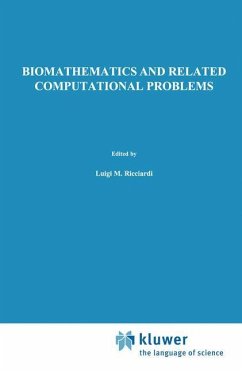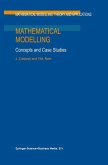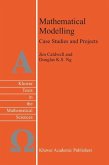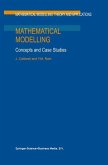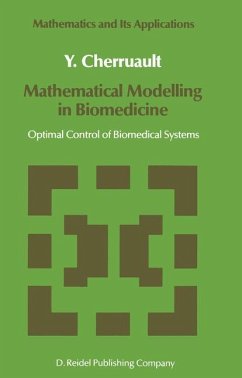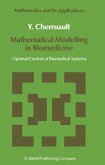L.M. Ricciardi (Hrsg.)
Biomathematics and Related Computational Problems
Herausgegeben:Ricciardi, L. M.
L.M. Ricciardi (Hrsg.)
Biomathematics and Related Computational Problems
Herausgegeben:Ricciardi, L. M.
- Gebundenes Buch
- Merkliste
- Auf die Merkliste
- Bewerten Bewerten
- Teilen
- Produkt teilen
- Produkterinnerung
- Produkterinnerung
Biomathematics emerged and rapidly grew as an independent discipline in the late sixties as scientists with various backgrounds in the mathematical, biological and physical sciences gathered together to form Departments and Institutes centered around this discipline that many at that time felt should fall between the cracks of legitimate science. For various reasons some of these new institutions vanished in the mid-seventies, particularly in the U. S. , the main reason for their demise being economic. Nevertheless, good biomathematical so that the range research has been ceaselessly carried…mehr
Andere Kunden interessierten sich auch für
![Biomathematics and Related Computational Problems Biomathematics and Related Computational Problems]() Biomathematics and Related Computational Problems76,99 €
Biomathematics and Related Computational Problems76,99 €![Mathematical Modelling Mathematical Modelling]() J. CaldwellMathematical Modelling39,99 €
J. CaldwellMathematical Modelling39,99 €![Mathematical Modelling Mathematical Modelling]() J. CaldwellMathematical Modelling39,99 €
J. CaldwellMathematical Modelling39,99 €![Mathematical Modelling Mathematical Modelling]() J. CaldwellMathematical Modelling38,99 €
J. CaldwellMathematical Modelling38,99 €![Mathematical Modelling in Biomedicine Mathematical Modelling in Biomedicine]() Y. CherruaultMathematical Modelling in Biomedicine39,99 €
Y. CherruaultMathematical Modelling in Biomedicine39,99 €![Mathematical Modelling in Biomedicine Mathematical Modelling in Biomedicine]() Y. CherruaultMathematical Modelling in Biomedicine39,99 €
Y. CherruaultMathematical Modelling in Biomedicine39,99 €![Emerging Technologies and Techniques in Porous Media Emerging Technologies and Techniques in Porous Media]() Derek B. Ingham / Adrian Bejan / Eden Mamut / Ian Pop (Hgg.)Emerging Technologies and Techniques in Porous Media292,99 €
Derek B. Ingham / Adrian Bejan / Eden Mamut / Ian Pop (Hgg.)Emerging Technologies and Techniques in Porous Media292,99 €-
-
-
Biomathematics emerged and rapidly grew as an independent discipline in the late sixties as scientists with various backgrounds in the mathematical, biological and physical sciences gathered together to form Departments and Institutes centered around this discipline that many at that time felt should fall between the cracks of legitimate science. For various reasons some of these new institutions vanished in the mid-seventies, particularly in the U. S. , the main reason for their demise being economic. Nevertheless, good biomathematical so that the range research has been ceaselessly carried on by numerous workers worldwide of this activity appears now as truly impressive: from useful and effective mathematical statements about problems that are firmly rooted in the 'wet' reality of biology to deep theoretical investigations on outstanding basic questions. It is also interesting to take note that some ideas and theories set forth by 'paleo-biomathematicians' almost a quarter of century ago are now becoming highly appreciated also by scientists engaged in quite different research fields. For instance, neural nets is the hot topic in computer science these days! Well aware of the growing interest in this relatively new field, years back I organized a small workshop on Biomathematics: Current Status and Future Perspectives which was held at the University of Salerno during the middle of April, 1980.
Produktdetails
- Produktdetails
- Verlag: Springer / Springer Netherlands
- Artikelnr. des Verlages: 978-90-277-2726-8
- 1988.
- Seitenzahl: 764
- Erscheinungstermin: 30. Juni 1988
- Englisch
- Abmessung: 241mm x 160mm x 46mm
- Gewicht: 1238g
- ISBN-13: 9789027727268
- ISBN-10: 9027727260
- Artikelnr.: 21525578
- Herstellerkennzeichnung
- Springer-Verlag GmbH
- Tiergartenstr. 17
- 69121 Heidelberg
- ProductSafety@springernature.com
- Verlag: Springer / Springer Netherlands
- Artikelnr. des Verlages: 978-90-277-2726-8
- 1988.
- Seitenzahl: 764
- Erscheinungstermin: 30. Juni 1988
- Englisch
- Abmessung: 241mm x 160mm x 46mm
- Gewicht: 1238g
- ISBN-13: 9789027727268
- ISBN-10: 9027727260
- Artikelnr.: 21525578
- Herstellerkennzeichnung
- Springer-Verlag GmbH
- Tiergartenstr. 17
- 69121 Heidelberg
- ProductSafety@springernature.com
I. Neurosciences and Related Problems.- Mathematical methods of neurodynamics and self-organization.- Problems connected with neuronic equations.- A birth-and-death model for single neuron's activity.- Spatio-temporal patterns of activity in neural systems: simulation and analysis.- Statistical inference for stochastic neuronal models.- A diffusion neuronal model and its parameters.- Parallel processing in nervous systems with converging and diverging transmission.- White-noise analysis of neuron circuitry.- Perception quantitatively analyzed.- Learning in a cortical-like neural system model.- II. Population Theories.- Ecology.- Dynamics of a lake ecosystem.- Oscillations of a biotic species feeding on an abiotic resource.- Estimating parameters and extinction probabilities in population stochastic differential equations models.- A mathematical framework for the life-cycle of plankto-benthonic invertebrates.- Balanced growth rates vs. balanced accelerations as causes of ecological equilibria.- A stochastic model of grass growth under grazing.- Spectral analysis of secondary growth patterns in Pinus uncinata.- Physiologically structured population models in risk assessment.- The management of marine fishery in Italy: a bio-economic optimization.- Optimal life history models: effects of nonlinearities in the response of reproductive success to investment.- Variations in the length of activity periods: a test of a general model by simulation.- Dynamics and Evolution.- Homotopy techniques in stability problems of delay-diffusion Volterra models.- A counting process approach for stochastic age-dependent population dynamics.- Local and global stability of discrete one-dimensional population models.- On the evolution of altruistic cooperation.- Lotka-Volterra models: partialstability and partial ultimate boundedness.- A mathematical model of age-structured population dynamics with density dependent diffusion.- Origins of order in evolution: self organization and selection.- A stable spatially non-constant equilibrium of Lotka-Volterra two-patch system with May-Leonard dynamics.- Stabilization in a nonlinear agedependent population model.- Theories of evolution of social behavior.- On the boundedness of solutions for cyclic predator-prey systems.- III. Morphogenesis and Pattern Formation.- A model for rouleaux pattern formation of red blood cells. Enumeration of absolutely stable patterns.- Concentration waves in aggregation fields of a cellular slime mold.- Pattern generation in cellular spaces.- Modeling of biological aggregation patterns.- IV. Theoretical and Computational Methods.- Shot noise random fields.- Scalar steady-state in population biology as a nonlinear eigenvalue problem.- Numerical studies of symmetry-breaking bifurcations in reaction-diffusion systems.- Structural laws for hierarchical systems.- Dynamics of Alopex process: application to optimization problems.- Investigation of precursor-product relationships in radiotracer studies.- On a learning neural network.- Some considerations on the relationships between human and artificial intelligence.- Some numerical problems arising in the discretization of population dynamics models.- Stability in models with long memories.- Bio-mathematical approach to a new-generation computer.- Parametric stability of model ecosystems.- On the maximum of Gaussian Fourier series connected with random vibrations.- On a strongly coupled parabolic system in population dynamics.- Some remarks on first-passage-time problems.- Nonlinear random reaction-diffusion systems.- V. Biological, Chemicaland Physical Systems.- Modification of the chaotic/order state of biological sistems by using electric fields.- Mathematical modelling for contracting muscle.- Macroscopic cardiac source model and propagation waves in excitable media.- Complexity and self-organization in enzyme catalysis: non-Kramers behaviours of the reaction rate.- Discrete and continuous media in the presence of a frequency gradient.- Electrical excitation propagation front in the cardiac muscle.- Artificial intelligence in medicine, cognitive science and epidemiological models.- Pattern-dynamics in excitable reaction-diffusion systems.- Symmetry breaking and Goldstone modes in neural nets.- On the elrctrical activity and glucose response of insuline secreting cells.- The dynamics of organizing centers: numerical experiments in differential geometry.- Name Index.
I. Neurosciences and Related Problems.- Mathematical methods of neurodynamics and self-organization.- Problems connected with neuronic equations.- A birth-and-death model for single neuron's activity.- Spatio-temporal patterns of activity in neural systems: simulation and analysis.- Statistical inference for stochastic neuronal models.- A diffusion neuronal model and its parameters.- Parallel processing in nervous systems with converging and diverging transmission.- White-noise analysis of neuron circuitry.- Perception quantitatively analyzed.- Learning in a cortical-like neural system model.- II. Population Theories.- Ecology.- Dynamics of a lake ecosystem.- Oscillations of a biotic species feeding on an abiotic resource.- Estimating parameters and extinction probabilities in population stochastic differential equations models.- A mathematical framework for the life-cycle of plankto-benthonic invertebrates.- Balanced growth rates vs. balanced accelerations as causes of ecological equilibria.- A stochastic model of grass growth under grazing.- Spectral analysis of secondary growth patterns in Pinus uncinata.- Physiologically structured population models in risk assessment.- The management of marine fishery in Italy: a bio-economic optimization.- Optimal life history models: effects of nonlinearities in the response of reproductive success to investment.- Variations in the length of activity periods: a test of a general model by simulation.- Dynamics and Evolution.- Homotopy techniques in stability problems of delay-diffusion Volterra models.- A counting process approach for stochastic age-dependent population dynamics.- Local and global stability of discrete one-dimensional population models.- On the evolution of altruistic cooperation.- Lotka-Volterra models: partialstability and partial ultimate boundedness.- A mathematical model of age-structured population dynamics with density dependent diffusion.- Origins of order in evolution: self organization and selection.- A stable spatially non-constant equilibrium of Lotka-Volterra two-patch system with May-Leonard dynamics.- Stabilization in a nonlinear agedependent population model.- Theories of evolution of social behavior.- On the boundedness of solutions for cyclic predator-prey systems.- III. Morphogenesis and Pattern Formation.- A model for rouleaux pattern formation of red blood cells. Enumeration of absolutely stable patterns.- Concentration waves in aggregation fields of a cellular slime mold.- Pattern generation in cellular spaces.- Modeling of biological aggregation patterns.- IV. Theoretical and Computational Methods.- Shot noise random fields.- Scalar steady-state in population biology as a nonlinear eigenvalue problem.- Numerical studies of symmetry-breaking bifurcations in reaction-diffusion systems.- Structural laws for hierarchical systems.- Dynamics of Alopex process: application to optimization problems.- Investigation of precursor-product relationships in radiotracer studies.- On a learning neural network.- Some considerations on the relationships between human and artificial intelligence.- Some numerical problems arising in the discretization of population dynamics models.- Stability in models with long memories.- Bio-mathematical approach to a new-generation computer.- Parametric stability of model ecosystems.- On the maximum of Gaussian Fourier series connected with random vibrations.- On a strongly coupled parabolic system in population dynamics.- Some remarks on first-passage-time problems.- Nonlinear random reaction-diffusion systems.- V. Biological, Chemicaland Physical Systems.- Modification of the chaotic/order state of biological sistems by using electric fields.- Mathematical modelling for contracting muscle.- Macroscopic cardiac source model and propagation waves in excitable media.- Complexity and self-organization in enzyme catalysis: non-Kramers behaviours of the reaction rate.- Discrete and continuous media in the presence of a frequency gradient.- Electrical excitation propagation front in the cardiac muscle.- Artificial intelligence in medicine, cognitive science and epidemiological models.- Pattern-dynamics in excitable reaction-diffusion systems.- Symmetry breaking and Goldstone modes in neural nets.- On the elrctrical activity and glucose response of insuline secreting cells.- The dynamics of organizing centers: numerical experiments in differential geometry.- Name Index.

